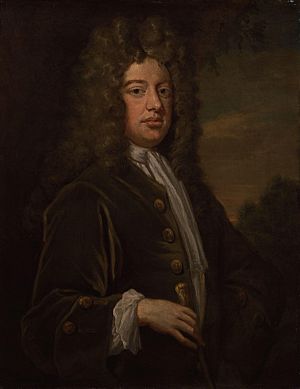William Walsh (poet) facts for kids
William Walsh (born October 6, 1662 – died March 15, 1708) was an English poet and critic. He also worked as a politician, serving in the English and British Parliaments from 1698 to 1708. He lived at Abberley Hall in Worcestershire, England.
Contents
About William Walsh's Life
William Walsh was the second of eight children born to Joseph and Elizabeth Walsh. They lived at Abberley Hall. One of his sisters, Octavia Walsh, was also a poet, though she kept it a secret.
In 1678, William went to Wadham College, Oxford University. He left the university without finishing his degree. After that, he returned to live in his home county.
Walsh's Time in Politics
William Walsh became a Member of Parliament (MP) for Worcestershire in 1698. He was re-elected in 1701 and 1702. An MP is a person elected to represent a group of people in the country's parliament.
In 1705, he became an MP for Richmond, Yorkshire. When Queen Anne became queen, William Walsh was given a special job. He became a "gentleman of the horse," which meant he helped manage the royal stables and horses. He held this job until he passed away in 1708.
William Walsh's Writings
William Walsh wrote several works during his lifetime. One of his books was called Dialogue concerning Women, being a Defence of the Sex (1691). This book was about defending women. He also wrote Letters and Poems, Amorous and Gallant (1692). These were love poems and letters. He said he wrote them to show "the faithful image of an amorous heart."
Walsh and Alexander Pope
William Walsh is best known for being a friend and helper to the famous poet Alexander Pope. In 1705, Pope's early poems, called Pastorals, were shown to Walsh. Walsh then started writing letters directly to the young Pope. These letters are now printed in Pope's collected works.
Pope visited Walsh at Abberley in 1707 and really valued his advice. Pope once said that Walsh told him there was a new way for poets to be great. Walsh believed that while there were many great poets, none were truly "correct" or perfect in their writing. He encouraged Pope to focus on making his poetry very precise and polished.
Some writings, like a life story of the poet Virgil, were once thought to be by Walsh. However, it was later found that another writer, Dr. Knightly Chetwood, wrote them. In 1704, Walsh also worked with other famous writers, Sir John Vanbrugh and William Congreve. They adapted a play by Molière called Monsieur de Pourceaugnac into an English version called Squire Trelooby. Walsh's poems can be found in various collections of British poets.
 | Victor J. Glover |
 | Yvonne Cagle |
 | Jeanette Epps |
 | Bernard A. Harris Jr. |


